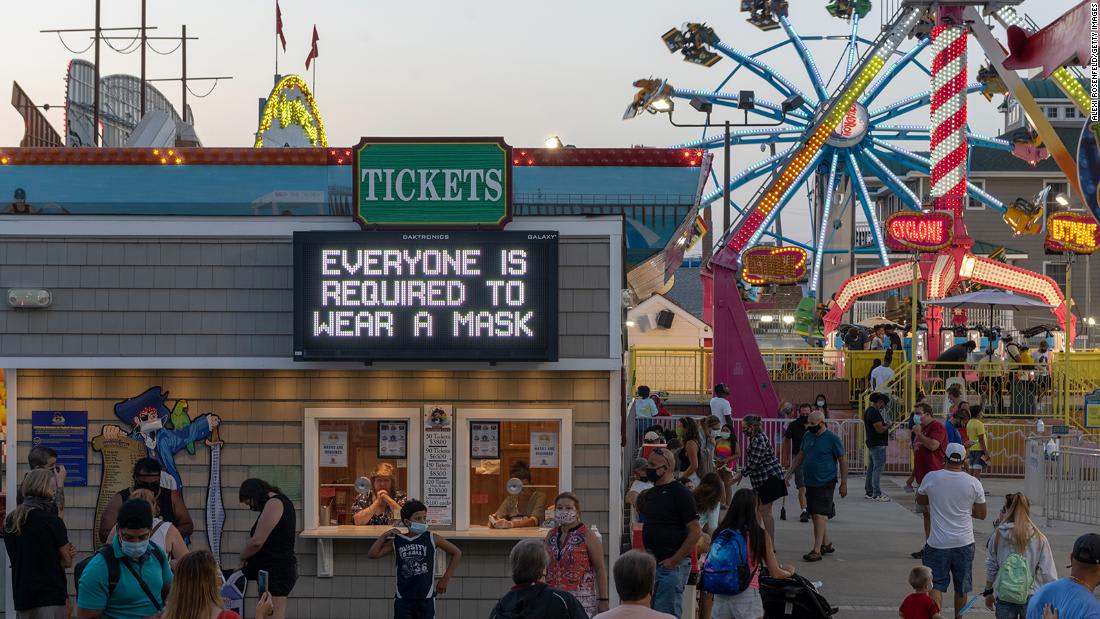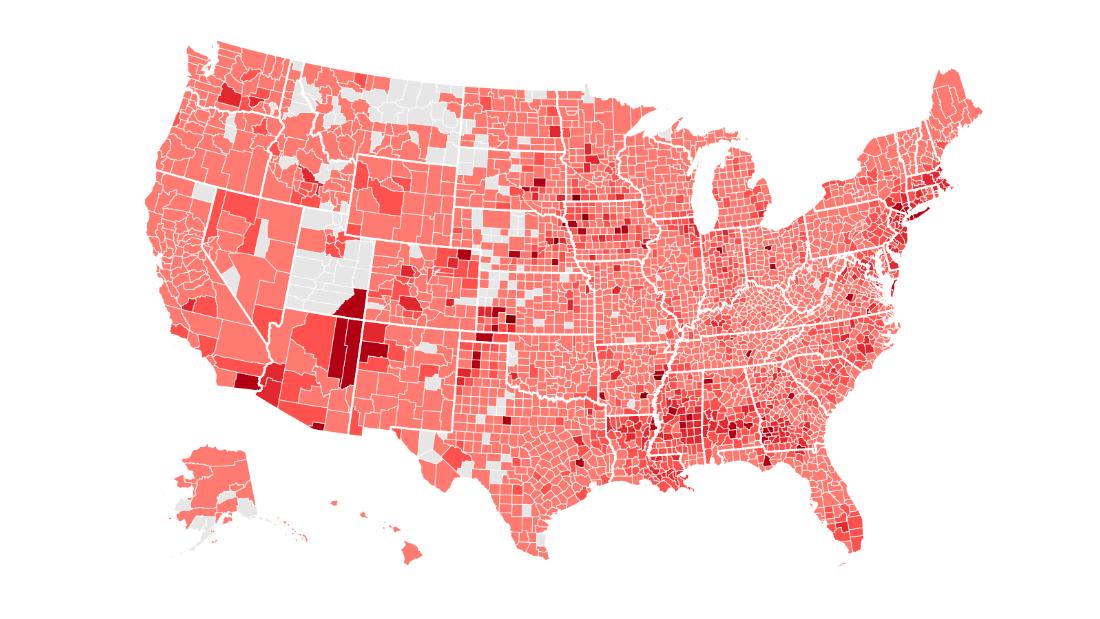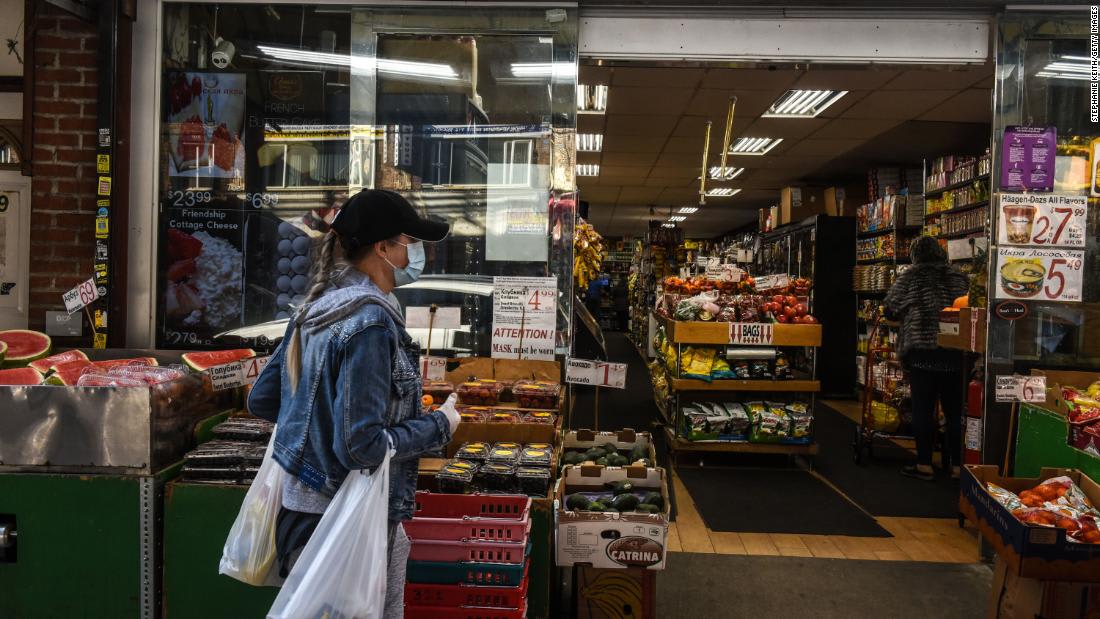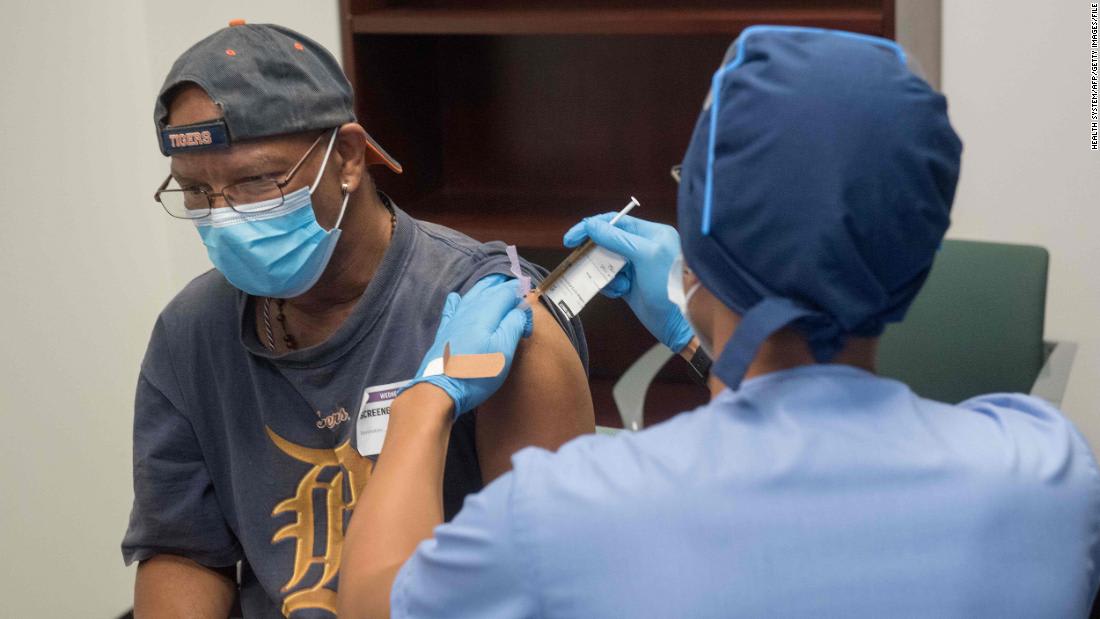New challenges in US battle against Covid-19 come with the approaching fall season
From CNN's Christina Maxouris
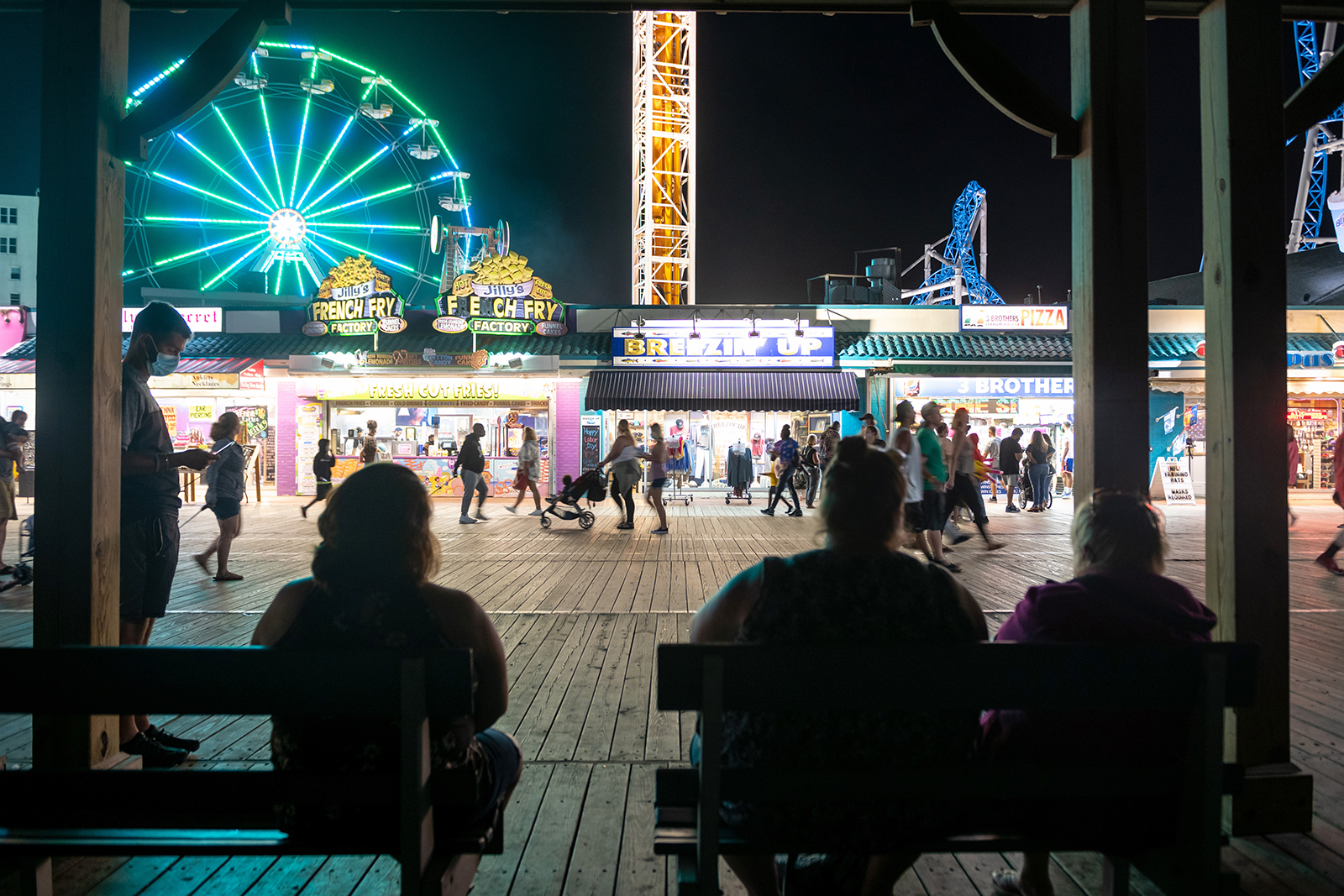 People sit on benches facing the ferris wheel in Ocean City, New Jersey on September 7. Alexi Rosenfeld/Getty Images
People sit on benches facing the ferris wheel in Ocean City, New Jersey on September 7. Alexi Rosenfeld/Getty ImagesAhead of Labor Day this year, health officials warned that how Americans chose to ring in the unofficial start of fall could shape what the next months in the country's battle against Covid-19 will look like.
The holiday crowds mark the unofficial end to a devastating summer across the country, with Covid-19 infections surging to more than 6.3 million and deaths topping 189,000. Experts have offered a grim prediction on what the fall and winter could look like, with the pandemic stacking up against flu season and new fronts opening up, including schools and college campuses.
"We're heading into the fall and the winter, when we would expect a respiratory pathogen like a coronavirus to start spreading more aggressively than it would in the summer time."
New challenges ahead: With cooler weather ahead, it's likely many of the gatherings that have already been taking place -- many against experts' advice -- will now move indoors, where health officials have said the virus can spread more easily.
Masks: Months into the pandemic, safety measures like face masks remain a point of contention nationwide -- despite experts' projections that more mask-wearing could mean thousands of lives saved by the end of the year.
Campuses and schools: With tens of thousands of students back on campus, institutions are facing massive challenges. Covid-19 cases in colleges have been linked back to activities including athletics, off-campus gatherings and Greek life.
Read the full story:
Hong Kong in travel bubble talks with 11 countries across Europe and Asia
From CNN's Chermaine Lee in Hong Kong
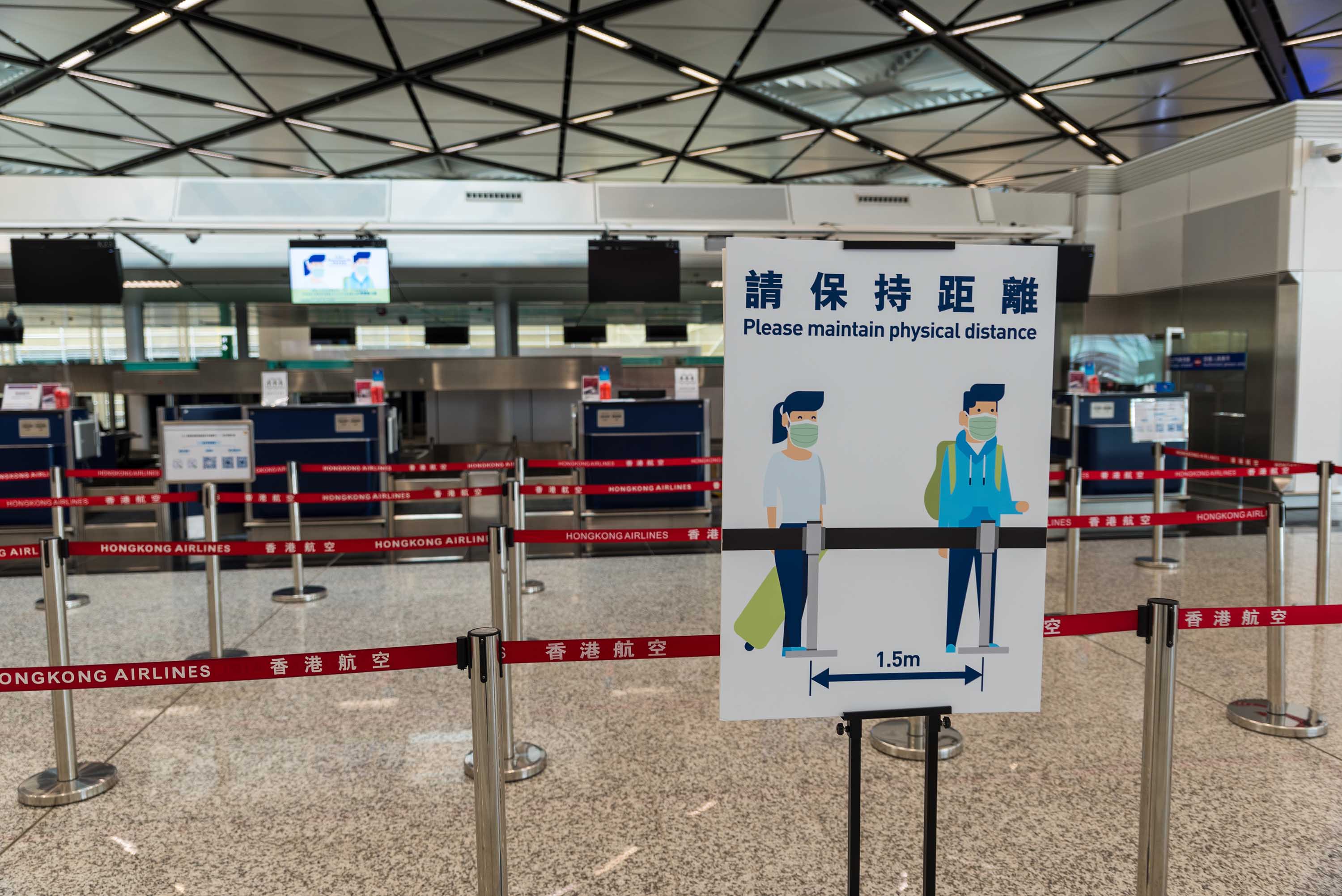 Social distancing guidance is posted on a sign in the check-in area at Hong Kong International Airport on September 4. Marc Fernandes/NurPhoto/Getty Images
Social distancing guidance is posted on a sign in the check-in area at Hong Kong International Airport on September 4. Marc Fernandes/NurPhoto/Getty ImagesOfficials in Hong Kong said they are discussing a potential travel bubble with 11 countries, as the territory is set to relax social distancing measures on Friday.
Hong Kong Secretary for Commerce and Economic Development Edward Yau said five or six nations have shown an interest, including Japan and Thailand.
Other countries discussed for the travel bubble are South Korea, Australia, New Zealand, Germany, France, Switzerland, Vietnam, Malaysia and Singapore.
Yau said that travelers within the bubble might be required to take a coronavirus test before departure and upon arrival, and could be limited to visit a few tourist attractions with quotas.
Cases ease: Hong Kong reported six new Covid-19 cases in the past 24 hours, three of which were were locally transmitted. This is the lowest number of daily cases announced since a third wave of the virus hit the city in July.
Xi Jinping says China acted in a "transparent, and responsible manner" on Covid-19
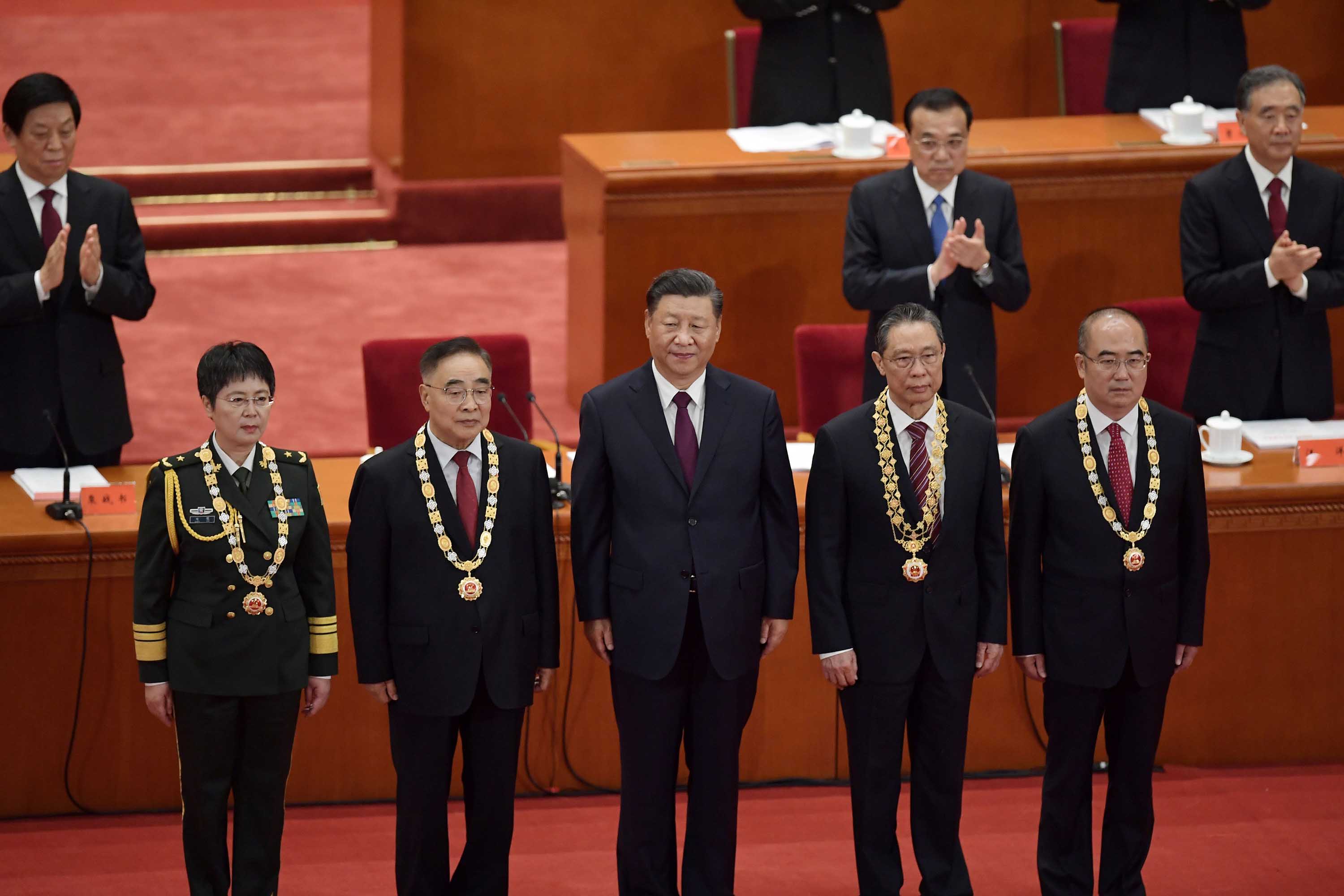 Chinese President Xi Jinping, center, stands with honourees (from left) Chen Wei, Zhang Boli, Zhong Nanshan, and Zhang Dingyu, as they receive awards during a ceremony to honor people who fought against the pandemic, in Beijing, on September 8. Nicolas Asfouri/AFP/Getty Images
Chinese President Xi Jinping, center, stands with honourees (from left) Chen Wei, Zhang Boli, Zhong Nanshan, and Zhang Dingyu, as they receive awards during a ceremony to honor people who fought against the pandemic, in Beijing, on September 8. Nicolas Asfouri/AFP/Getty ImagesChinese President Xi Jinping said China acted in an "open, transparent, and responsible manner" in its handling of the coronavirus pandemic.
Xi made the comments while awarding medals to four people for their outstanding contributions during the pandemic at a ceremony today in Beijing.
Among the four were the country's top respiratory disease expert, Zhong Nanshan, according to Chinese state broadcaster CCTV.
"We, in an open, transparent, and responsible manner, actively fulfilled our international obligations."
Xi said China reported information on the virus "at the earliest time possible" to the World Health Organization "and relevant countries, regions and organizations."
"China is the first major economy to resume growth after the heavy blow of Covid-19, and is leading the world in virus control and prevention and economic recovery, which shows China's great capacity for restoration and exuberant vitality," he said.
China has been criticized for downplaying or even covering up the severity of the virus at the start of the pandemic, and for ignoring evidence that it spread from person-to-person until it was too late.
China has repeatedly denied these claims.
Hong Kong to relax social distancing measures from Friday
From CNN's Chermaine Lee in Hong Kong
Hong Kong will enter its third phase of relaxing social distancing measures on Friday, Secretary for Food and Health Sophia Chan said in a news conference today.
This phase will see the number of diners allowed to eat together at restaurants increased from two to four, and allows certain entertainment venues to reopen, such as arcades, performance venues, mahjong centers, indoor sports facilities and public entertainment venues.
The third phase will also allow up to four people to gather publicly instead of two.
Amusement parks -- including popular attractions Disneyland and Ocean Park -- can "hopefully" reopen on September 18, Secretary for Commerce and Economic Development Edward Yau added.
Travel bubble talks: Yau also said Hong Kong is discussing a potential travel bubble with 11 countries. Five or six nations have shown an interest, including Japan and Thailand, he said.
Other countries discussed for the travel bubble are South Korea, Australia, New Zealand, Germany, France, Switzerland, Vietnam, Malaysia and Singapore.
Yau added that travelers within the bubble might be required to take a coronavirus test before departure and upon arrival, and could be limited to visit a few tourist attractions with quotas.
Trickle of passengers as Delhi subway returns from coronavirus lockdown
From CNN's Esha Mitra in New Delhi
About 15,500 passengers traveled on the Delhi metro in India on Monday, the first day that subway trains came back into service after a five-month closure due to the pandemic.
That's a little over one-hundredth of the 1.5 million people who traveled on these trains daily prior to lockdown measures, according to the Delhi Metro Rail Corporation (DMRC).
Trains had reduced operating times -- running for four hours in the morning and four hours in the evening -- and reducing the carrying capacity to just 20% compared to usual.
The metro resumed services of one of its busiest lines on Monday and its nine other routes will resume operations in a graded manner by September 12. DMRC has also advised passengers to avoid non-essential travel to avoid over crowding.
All public transport, including suburban trains, was suspended when India announced a nationwide lockdown on March 24, amid a growing coronavirus epidemic.
Rising cases: The trains resumed operations as infections surged to a fresh daily high of 90,802 new cases Monday that saw India surpass Brazil as the country with the second-highest number of total cases, after the United States.
On Tuesday, India recorded 75,809 new coronavirus cases and 1,133 deaths, according to the Indian Ministry of Health.
That brings the nationwide total to 4,280,422 cases, including 72,775 deaths, the ministry said.
US reports more than 24,000 new Covid-19 cases
The United States recorded 24,362 new cases of the novel coronavirus on Monday, bringing the nationwide total to at least 6,300,727 infections, according to Johns Hopkins University.
The death toll rose to at least 189,206 after 265 new virus-related fatalities were also recorded Monday.
The totals include cases from all 50 states, the District of Columbia and other US territories, as well as repatriated cases.
CNN is tracking US coronavirus cases here:
It's highly unlikely that food is a source of Covid-19 contamination, experts say
From CNN's Lauren M. Johnson and Naomi Thomas
A team of experts on food contamination says it is highly unlikely that food is a source of Covid-19 transmission.
The International Commission on Microbiological Specifications for Foods (ICMSF) looked at the evidence that coronavirus might be carried on food or its packaging and found very little.
Their finding mirrors earlier reporting from the US Food and Drug Administration that there is no real risk of getting the virus that causes Covid-19 from food or food packaging.
"There are no foods that should be considered a risk or warrant consideration as a vector for SARS-CoV-2."
While it is possible that people could eat something contaminated with the virus and become infected that way, it's never been seen to have happened, they said.
However, it is still prudent to emphasize good food hygiene practices, the group said.
Read the full story:
Another federal official raises questions about Trump's vaccine timeline
From CNN Senior Medical Correspondent Elizabeth Cohen
Another federal official is making it clear that despite US President Donald Trump's predictions, there's hardly any chance a vaccine will be available to Americans by Election Day.
Trump, however, has projected optimism for a quicker timeline.
"(It's) going to be done in a very short period of time -- could even have it during the month of October," the President said at a press briefing Monday. "We'll have the vaccine soon, maybe before a special date. You know what date I'm talking about."
On August 6, Trump said he was "optimistic" a vaccine would be ready by around November 3.
"I believe we'll have the vaccine before the end of the year, certainly, but around that date, yes. I think so," Trump said.
And at a rally last week, he said, "It will be delivered before the end of the year, in my opinion, before the end of the year, but it really might even be delivered before the end of October."
The federal official is not the first to cast skepticism on Trump's forecast.
It's "extremely unlikely, but not impossible" that a Covid-19 vaccine could be authorized for emergency use by the US Food and Drug Administration before the end of October, Moncef Slaoui, the chief adviser to Operation Warp Speed, told NPR last week.
Dr. Larry Corey, who's leading a group set up by the National Institutes of Health to work on coronavirus vaccines, also said he doesn't think there will be a vaccine available by Election Day.
"I would agree with Dr. Slaoui. The chances are very low, very remote," said Corey, who leads the COVID-19 Prevention Network.
Read why the US likely won't have a vaccine by Election Day:
Mexico reports nearly 3,500 new Covid-19 cases
From CNN’s Natalie Gallón in Mexico City and Sharif Paget in Atlanta
Mexico’s Health Ministry identified 3,486 new Covid-19 infections on Monday, bringing the country’s total number of cases to 637,509.
The Health Ministry also recorded 223 new virus-related fatalities, raising Mexico’s death toll to 67,781.
Mexico has the world’s fourth-highest count of coronavirus deaths, trailing the United States, Brazil and India respectively, according to Johns Hopkins University.
Excess deaths: Over the weekend, Mexico’s Health Ministry said it had recorded 122,765 excess deaths in the country during the pandemic.
Mexico’s government has said for months that its death toll from Covid-19 is higher than official figures due to low testing in the country. But that lack of testing makes it impossible to know exactly how many of the total amount of excess deaths were due to the virus.

 5 years ago
683
5 years ago
683 